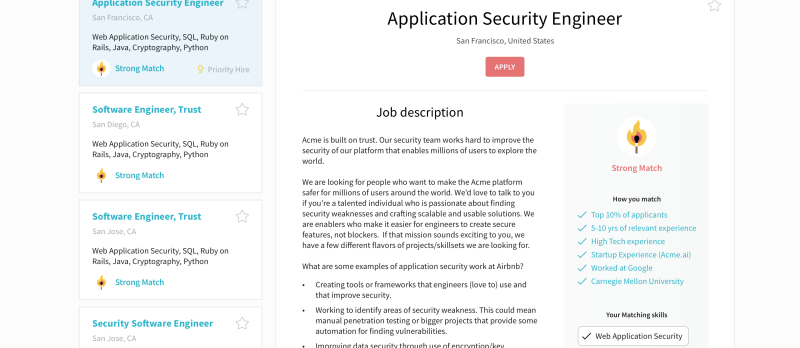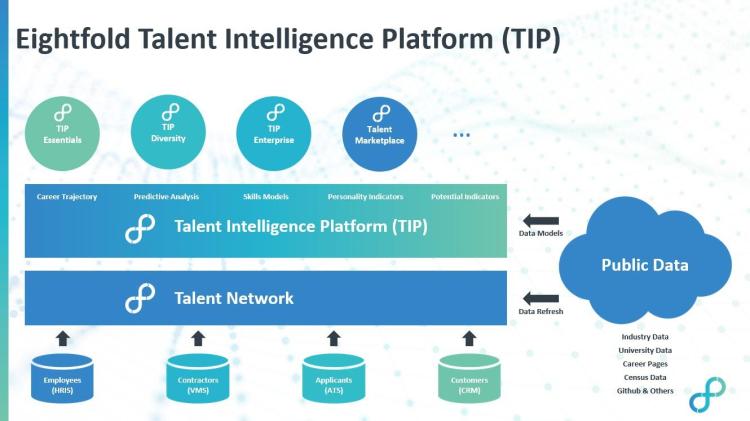It’s tough finding qualified candidates. In the U.S., it takes about 43 days from the time a listing is published to the day a would-be employee accepts an offer, and bringing on a single job seeker can cost upwards of $4,129. Unsurprisingly, 63% of executives in a Gartner survey named talent shortage as the top risk facing their organizations.
Eightfold seeks to address those hiring challenges with AI and machine learning, and it’s raising venture capital to gear up for growth. The Mountain View, California-based talent platform provider today announced that it’s raised $28 million in series C financing led by IVP, with participation from Foundation Capital and Lightspeed Ventures. The capital infusion follows on the heels of a $5.7 million series A round in September 2017 and an $18 million series B round last April, and it brings Eightfold’s total raised to $55 million.
Just a year after emerging from stealth, Eightfold managed to attract high-profile clients like Conagra, Hulu, Affirm, Twilio, AdRoll Group, Tata Communications, DigitalOcean, and over 100 others across four continents, and it teamed up with channel partners including SAP to integrate its products with human resource information systems and applicant tracking systems like SuccessFactors Employee Central and SuccessFactors Recruiting. In yet another milestone, Eightfold recently became the exclusive job-matching platform for Aijob, an initiative applying AI to coaching and training Norwegian citizens with disabilities.
“It’s our mission to help enterprises turn talent management into a competitive advantage while identifying ‘what’s next’ for individuals,” said CEO and cofounder Ashutosh Garg. “Our AI platform is allowing us to innovate and collaborate with our customers and partners at an unprecedented speed and scale. Our growing team is delighted and privileged to solve employment for everyone.”
June 5th: The AI Audit in NYC
Join us next week in NYC to engage with top executive leaders, delving into strategies for auditing AI models to ensure fairness, optimal performance, and ethical compliance across diverse organizations. Secure your attendance for this exclusive invite-only event.

Above: One of Eightfold’s SEO-optimized job listings.
Garg, previously a Google and IBM researcher with over 50 patents and 35 published research papers to his name, founded Eightfold — whose namesake is the Eightfold Path in Buddhist philosophy — in 2016 with Varun Kacholia, who formerly led Facebook’s News Feed and YouTube’s search and recommendations teams. With a small team of engineers and data scientists, the two set out to address recurring pain points in online recruiting: inadequate accounting for candidates’ work experiences, roles, skills, and educational backgrounds, and a dearth of sophisticated sharing, outreach, and sorting tools.
“Poorly crafted career sites and job descriptions hinder the application process by failing to attract qualified talent and — even worse — dissuading diverse candidates,” Garg said. “With a surplus of available opportunities within any given organization, the majority of candidates say the hardest step in the job search is finding the right role.”
Eightfold brings to the table a highly individualized, machine learning-driven job matching engine that taps “billions” of data points from more than 100 million profiles to provide recommendations to recruiters, hiring managers, and candidates. It tasks job seekers with creating accounts containing their experiences, locations, education histories, CVs, and resumes, which algorithms parse for key capabilities.
In effect, Eightfold aims to tell whether a person is likely to be considered for a position before they submit an application — whether they’re an internal or external candidate.

Above: Recruiters see candidates ranked by relevancy.
Job seekers get a list of best-fit available roles at companies along with a relevancy assessment of their skills, and access to a chatbot to which they can discuss job fit, benefits, and work culture. As for recruiters, they’re able to specify things like diversity goals, degree levels, and other requirements, and optionally mask matched candidates’ age, gender, ethnicity, and geography to minimize the potential for prejudice.
Toward that end, Eightfold claims that its specially tuned, debiased algorithms — which ingest publicly available web data to generate a “Platonic ideal” of any business in virtually any industry — have resulted in a collective 19% increase in hiring of women across its clients.
Beyond its use of AI, Eightfold seeks to stand out from the crowded pack of job site competitors by supplying SEO-optimized job pages and a one-click application process and supporting custom content on company profiles — including videos. Additionally, for customers’ existing employees, it provides a career planner that predicts career trajectories and offers access to a career coach.
Eightfold claims that across the more than 20 million applications it’s processed to date, it’s observed up to 80% recruiter time savings, a 200% increase in qualified candidates, and a 60% reduction in cost to hire. Moreover, it says that it can deliver results in sub-second timeframes even for requests involving millions of records.
AI-driven talent recruitment tools are fast becoming a dime a dozen, which is hardly surprising. In theory, they offer employers far greater insight into candidates’ personalities, histories, and experience than cover letters and resumes alone ever could. Startups like Eightfold and Vervoe tap machine learning algorithms to assess would-be employees’ skills, while ZipRecruiter and Indeed use them to match businesses with job seekers they might otherwise pass over.
Despite the increased competition, though, Garg believes Eightfold is well-positioned to expand its reach in the $200 billion recruiting market.
“At Eightfold, we’re shifting the focus away from vague lists of requirements and toward content that candidates care most about — the work they will do, the people they will get to work with, and their likelihood of getting the job,” he added. “Regardless of whether a candidate is ultimately hired, candidates with a positive experience applying to work at a company are more likely to buy its products, as well as recommend other individuals to apply for a position there.”


